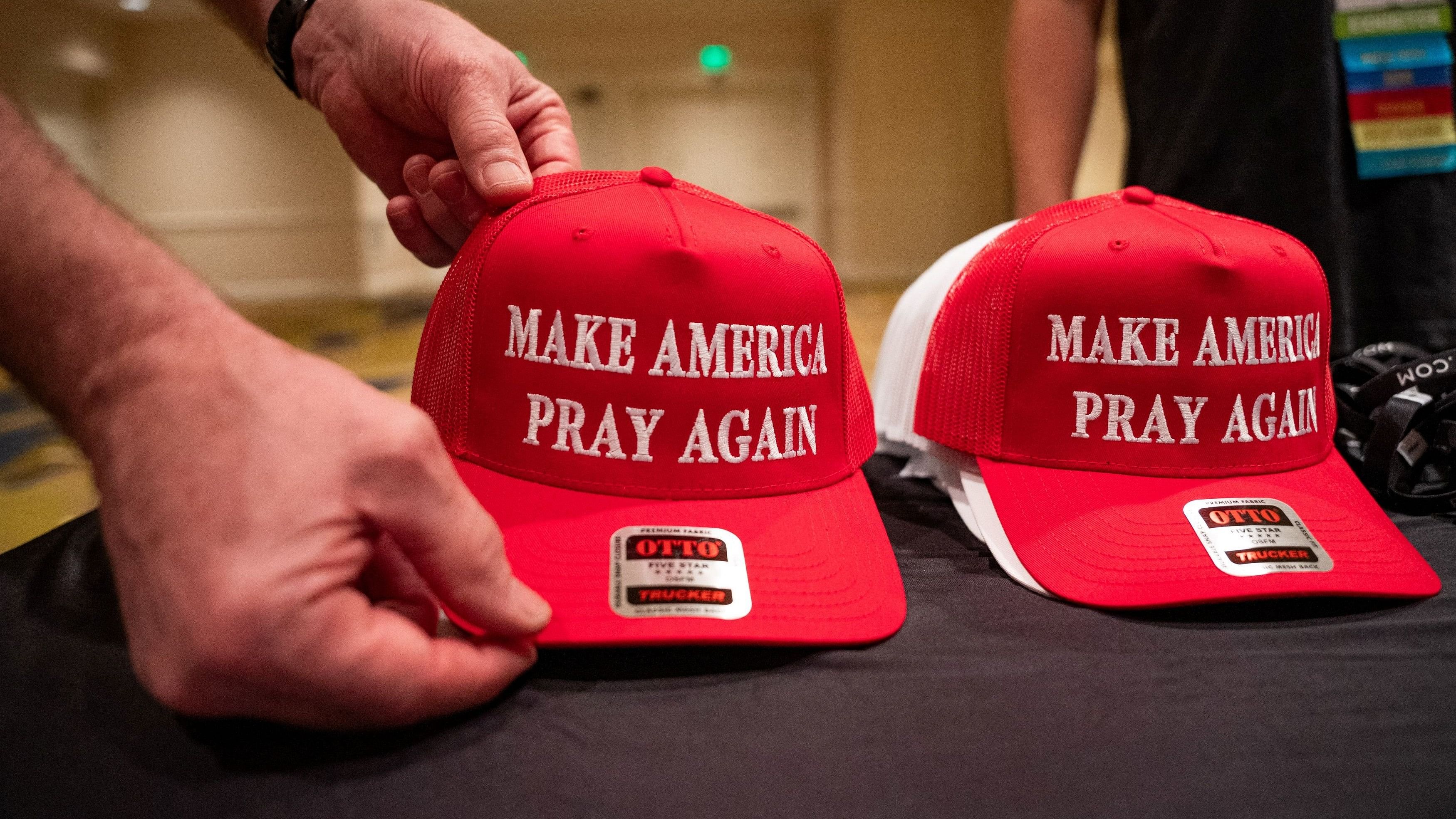
Hats with the slogan 'Make America Pray Again' are displayed at the 2024 National Religious Broadcasters Association International Christian Media Convention, earlier this year.
Credit: Reuters Photo
By Francis Wilkinson
Donald Trump, a 77-year-old Bible salesman from Palm Beach, Florida, has emerged as the nation’s most prominent Christian leader. Trump is running for president as a divinely chosen champion of White Christians, promising to sanctify their grievances, destroy their perceived enemies, bolster their social status, and grant them the power to impose an anti-feminist, anti-LGBTQ, White-centric Christian nationalism from coast to coast. That Trump doesn’t attend church and has obviously never read the book that he hawks for $59.99, seems of interest exclusively to his political opponents.
What might catch the attention of some evangelical conservatives, however, is that Trump’s ostentatious embrace of White Christian militantism coincides with a precipitous decline in religious affiliation in the US. According to the Public Religion Research Institute, one-quarter of Americans in 2023 said they were religiously unaffiliated. “Unaffiliated” is the only religious category experiencing growth.
In a single decade, from 2013 to 2023, the percentage of Americans saying that religion is the most important thing, or among the most important things, in their life plummeted to 53 per cent from 72 per cent.
“The drop in the percentage of Americans saying religion is important in their lives is stunning, especially in just a short 10-year period,” said Michael Emerson, a sociologist at Rice University and author of several books on American Christianity. “The now-intimate tie between religion and a host of political and social positions, for many people, either drives them away from religion altogether or leads them to distance themselves.”
In effect, militant Christian conservatism, now tightly wrapped in the gaudy corruption of Trumpism, has produced a backlash. “An increasing number of Americans have an allergic reaction to the mixture of religion and conservative politics, including the MAGA movement,” said David Campbell, a political scientist at Notre Dame University and coauthor of Secular Surge: A New Fault Line in American Politics. According to Campbell, “To these people, religion is equated with conservative politicians and policies. If that is not their politics, they want nothing to do with religion. This was true before the emergence of Trump and the MAGA movement but has accelerated since so many evangelical leaders have embraced Trump.”
That so many White Christian conservatives swoon to Trump’s invective and false witness is not all that perplexing. “Evangelicals hadn’t betrayed their values” in backing Trump, writes historian Kristin Kobes Du Mez in her 2020 book, Jesus and John Wayne: How White Evangelicals Corrupted a Faith and Fractured a Nation. Their support, she writes, is “the culmination of their half-century-long pursuit of a militant Christian masculinity” that disdains pluralism and valorizes masculine aggression.
Trump made headlines in 2016 when he posited that he could shoot someone on Fifth Avenue and not lose votes. It’s likewise notable that he made the statement at a speech at a Christian college in Iowa. “The crowd laughed and clapped, and someone in the audience shouted out love for the candidate,” the Washington Post reported.
Religious non-affiliation began to rise in the 1980s and 1990s in sync with and in reaction to the rise of the Religious Right. A study by Campbell and colleagues found that people are more likely to say that they lack a religious identity after reading a news story about a Religious Right candidate.
As Christian militancy and Trumpism merge, it’s getting harder to distinguish between them. “We see conservative or Republican Americans becoming more likely to identify as evangelical Christians, not because they've had a conversion experience, but because those identities (conservative, Republican and evangelical or traditional Catholic) are becoming aligned,” said Samuel Perry, a political scientist at Oklahoma University and co-author of books on conservative American Christianity.
The MAGA-Christian merger has produced a gusher of political power, directing state force against disfavored minorities, such as migrants and LGBTQ children and adults, and forging a US Supreme Court majority that routinely imposes narrow racial and religious values on a pluralistic nation.
It’s less clear what Christianity has gotten from the deal. “Younger, left-leaning, or moderate Americans who might have formerly identified as ‘Christians’ in decades past are growing up in a world where the most famous representative of conservative Christian values is Donald Trump. They’re saying, ‘No thanks,’” Perry said.
Few who flee church are clamoring to get back in. “The vast majority of the religiously unaffiliated appear content to stay that way,” said Robert Jones, president and founder of PRRI, pointing out that only 9 per cent of the religiously unaffiliated say they are seeking a religion that’s right for them. “My hunch,” he said, “is that if there is a Trump effect to these dynamics, his takeover of the Republican Party and conservative White Christian politics has been confirming to many who left that they made the right decision.”
It has long been debated whether Americans would ultimately follow Europe’s example in abandoning organized religion or whether American exceptionalism, especially its exceptional conservatism, would keep new generations in the pews. Conservatives warned of the terrible toll Europeanization would take on the nation’s soul. The problems for Christian conservatives turned out to be closer to home: a biting hunger to impose their will, and fealty to a ridiculous huckster promising salvation in installments of $59.99.